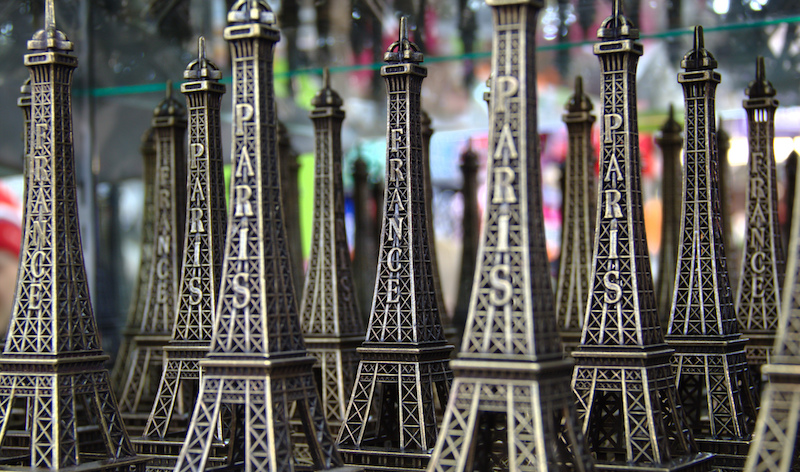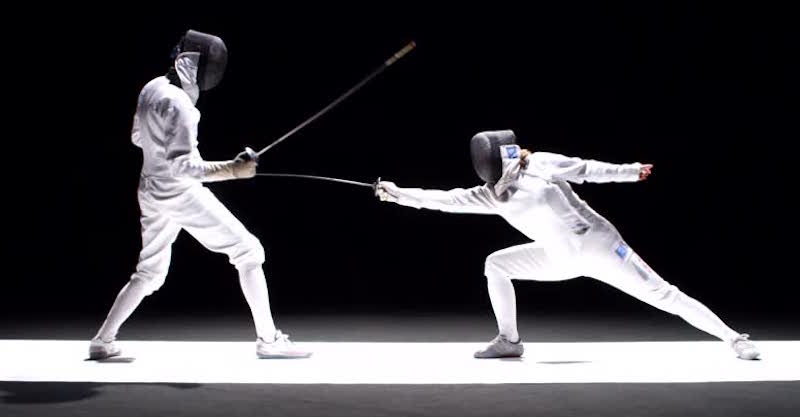French Words Used in English
Déjà Vu and Déjà-Vu
“I’m having déjà vu” has somehow secretly slipped into English to solely describe an inexplicable instance that may have never actually happened.
“Already seen” is the English translation of the French phrase with which we associate that weird feeling of reliving the same past experience.
In France you’ll hear this word on an daily basis, because it’s used to express “having re-seen” a person, place or things, not in another life or dimension. In other words, it’s a factual encounter.
The French do too believe in the weird phenomenon (of course they do!), but have a different way of spelling it (with a hyphen), déjà-vu. There is no difference in pronunciation though, which is why context is always key!
Mirage

Mirage in a desert.
That word we all learn to describe the illusion of a cold water fountain in the distance while trekking through a long, hot desert.
To “look at” or “wonder at” is the literal translation of this French word (having Latin roots). It also means to mirror or admire in French, hence why English speakers use mirage to define a visual wish or desire.
In a modern sense, mirage is a natural phenomenon caused by atmospheric optics and the sun’s rays that professional photographers use at their disposal to create beautifully, distorted images. Contrary to popular belief, a mirage is not a hallucination or optical illusion, though the French also use mirage as the English do.
Façade
Façade has multiple uses. For one, it’s a fancy word in English for telling someone they’re “fake”, or more nicely, “putting up a front”, “frontage” or “face” is the literal English translation of this French word, but not exactly a person’s face, as figuratively used in English.
Face [fas] in French is the word for “face” in English, so we see where the English picked up that figure of speech, but visage in French literally describes the body part of a person’s “face”.
More commonly, in both English and French, façade is the “front” or “side” of a building, while the expression en face means “in front of”.
Pot-pourri

Christmas pot pourri.
Ready to laugh?
Pot-pourri translated into English is…drum role… “rotten pot”. In French it’s spelled pot-pourri or pot pourri, and has the same meaning as its English counterpart: fragranced dried flower, fruits and herbs used to get rid of bad odors.
Some, mostly women, place pouches of potpourri in their drawers and armoires (another French word) to keep clothes smelling fresh—yes, leave it to the French.
It’s also the French word for a Spanish stew made in Burgos (olla podrida), made from a large variety of ingredients—which explains the other English definition of pot-pourri: a collection of diverse items.
Hors d’œuvre

Hors d’œuvre.
A favorite French phrase that gets our appetite going (oh hey, “appetite” is another French one, appétit!), to us English speakers, hors d’oeuvre screams lavish parties and cocktail hour.
“Out of work” is the literal translation, hors (out) d’œuvre (of work). Historical context: Hors d’œuvre were served before/”out” of the main course or “work” of art (by the chef) and thus, hors d’œuvre was born. The “d” gets contracted to the word “œuvre” due to the French vowel rule, but you should already know that!
Note: In French, the word hors d’œuvre is invariable, meaning that it doesn’t take an “s” in the plural!
Cul-de-Sac

“Cul de sac” road sign.
Pronounced [kuhl-duh-sak], is another funny French phrase. “Butt of a bag,” meaning “bottom of the bag,” is the literal translation: cul (butt) de (of a) sac (bag), though the original meaning has nothing to do with how English or French speakers actually use the phrase.
Is it all coming back to you now?
Cul-de-sac, mostly seen in real-estate writing, is an elegant English way to say the “dead end” of a road. In French, the elegant, more formal way to say “dead end” is “impasse,” not cul-de-sac.
Though we try to be, now we know the phrase cul-de-sac is not truly elegant whatsoever, which is a just one of the many created by the French with the word “cul” (butt).
Matinée

Sunrise.
The “first showing” of a movie or spectacle, how much do we love those? They’re affordable and place you on top of a movie critic’s (critiques, another French word) list.
On the French side, matinée, like “matin,” means “morning,” as well as the “entire morning” (from sunrise to noon). While the French might also have their matinée movie deals, for them it refers to the “first showing” in the afternoon, not morning.
Encore
You shout “Encore! Encore! Encore!” while giving a standing ovation, raising both of your hands clasped together to make a single fist, shaking it from left to right.
A phrase English speakers use after an impeccable performance. So good, that you need more, encore!
For English speakers encore is only related to show biz, but in French it’s a daily dose. “Again” or “another” are the literal translations. “Yet,” “still” or “even” are more intricate translations. “Pas encore,” “not yet,” is commonly used too.
Souvenir

Eiffel Tower souvenirs.
If you’re returning from an amazing trip, you’ll no doubt bring back an amazing gift for yourself or friends, a.k.a. souvenir—a tiny piece of memorabilia.
For English speakers a souvenir is tangible, physical, and visible. For the French too, but not exactly. The verb souvenir also means to “remember” or “recall.” For example:
S’en souvenir. (to remember/recall)
So while the word souvenir in French does describe a physical relic that induces “recollection,” it also defines any old “memory.”
Touché

Touché !
Touché, “I gotch ya” or “nice one,” is how English speakers express the French phrase, usually after a smart aleck remark or quick, witty response. In fencing (or any battling), touché can also be a “hit.”
Risqué
If a woman’s shirt is cut too low your grandmother would say she’s risqué. In English, risqué takes an improper, indecent tone that’s sexually suggestive.
Risqué [rees-key] or risque [ri-skey], the latter sounding similar to how we say “risk” in English, are the two pronunciations in French which have the same and only meaning of “risk” in English. Note that risqué with an accent over the “e” indicates past tense in French, while risque is present.
Risqué may have moved into English because of Moulin Rouge, cabarets, and burlesque shows, but in French it only means “risk.”